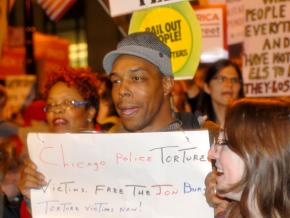Misdirecting the torture commission
, a victim of Chicago police torture who spent 28 years wrongfully incarcerated, describes how the process of hearing torture claims is being diverted.
ON JANUARY 22, the Illinois Torture and Inquiry Relief Commission (ITIRC) met in Chicago, and the room was packed, not with the supporters of victims of torture by Chicago police who were seeking justice, but with the family and friends of crime victims saying that the men appealing to the commission should not have their cases examined.
The ITIRC was set up to look into cases of people still behind bars in Illinois prisons who say they were tortured by Chicago police under the command of Jon Burge--the former commander who was fired from the department after allegations of abuse and coercion emerged, first in the case of Andrew and Jackie Wilson.
The January meeting focused on cases of three torture victims: Jerry Mahaffey, Jackie Wilson and Jaime Hauad. Last July, the ITIRC decided there was credible evidence that the three men were tortured at Area 2 headquarters. Their petitions for a hearing to determine whether they should get a new trial were granted.
Shortly after, it was revealed that ITIRC Executive Director David Thomas had failed to notify family members of victims in cases where there relatives were involved and torture claims had been made. This was a provision of the state law establishing the commission. Last October, the ITIRC voted to rescind their recommendations for a judge to consider new trials for Mahaffey, Wilson and Hauad. Thomas resigned his position.

The January 22 meeting of the commission was set to reconsider these three cases, and the hearing room was crowded with hundreds of people, many relatives of crime victims themselves, who were mobilized to show support for the family members of victims in these cases.
It's clear that the people who see themselves as supporters of the victims have the ITIRC's proceedings confused with a criminal trial. More than a dozen people who spoke in the hearing were only able to provide facts about the murders the three men were accused of. These speakers denied that torture had taken place against the men, but didn't provide any evidence whatsoever to prove this.
Most of the speakers who said they were standing up for the victims were rude and emotional. Aided by wealthy attorneys, former Police Superintendent Phil Cline and members of the Cook County state's attorney office, they called for the petitions not processed correctly by former director Thomas to be denied and not even considered for re-investigation. Chairman Cheryl Starks was forced to summon security when some of these speakers refused to end their testimonies after their time had expired.
As a Chicago police torture survivor myself, I was permitted to speak. While expressing sorrow to the family members of crime victims for the loss of their love ones, I explained to them they could not say for certain that these men were not tortured, and that the ITIRC had the responsibility to decide in these cases whether torture occurred, not to re-adjudicate the cases based on guilt or innocence.
Many in the audience became disruptive after it became clear that I was not in the room to support them, but to support Mahaffey and Wilson--they begin to walk out of the room until the chair informed them they would not be able to return. These audience members whispered and talked while I was speaking and labeled me a supporter of guilty men.
They don't understand that their frustration is misdirected toward the commission, when it should be directed at Jon Burge, whose torturers tainted the possibility of a fair investigation of these crimes, and former Mayor Richard Daley, who was Cook County state's attorney when the men were tortured.
SOME OF the men who were tortured by Chicago police are guilty of the crimes they were accused of. But to deny them a fair and adequate hearing before the ITIRC amounts to another level of injustice.
It's wrong to say that we are a nation of integrity and justice when it's clear that men were brutalized by police to make confessions against their will. In 2011, the Illinois Supreme Court ruled in the case of People v. Stanley Wrice that no coercion that amounts to torture can be ruled as harmless error and their right to hearings on their torture claims dismissed.
This stress on giving family members of crime victims notification and the right to speak in these proceedings is a further attack on the civil liberties of the men who say they have been tortured. None of them can testify to what took place inside the interrogation rooms in Area 2 police headquarters and will only add confusion to the commission's already difficult task of re-investigating 30-year-old cases where torture is claimed.
At the January 22 meeting, the mother of Jaime Hauad was left confused and emotionally drained as she listened to all that occurred inside the meeting room. Her son's case was deemed moot when the commissioned decided to only accept Burge torture cases from 1972 to 1993.
Hauad's case was one of the three rescinded because relatives of the victims hadn't been notified of the commission's investigation of torture. One such relative of a victim in the Hauad case testified last year that he felt it was wrong that he wasn't notified, but he also believed torture could have occurred in the case, because he has a family member incarcerated as the result of being physically and psychologically mistreated by police.
The ITIRC is expected to make a ruling about the petitions in the Mahaffey and Wilson cases by March, which might result in even more frustration nd bitterness in this flawed process.


